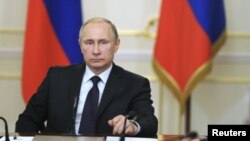The global anti-corruption group Transparency International is once again getting pressured by the Kremlin. The move is seen by Russia analysts as part of a broad plan to stifle criticism of Russian President Vladimir Putin’s administration.
Russian prosecutors recently warned TI’s Russian branch, which has been active for more than 15 years, that it may be compelled to register as a “foreign agent.” The state’s justification for that demand comes from TI’s Russian operations getting some funding from the group’s Berlin world headquarters.
The NGO says the government warning accuses it of “actual activity [that] includes interfering with the government’s policy in the fight against corruption by lobbying [for] its own proposals to change it.”
A similar warning about foreign agent registration was made to TI-Russia in 2013.
Jeffrey Mankoff, deputy director of the Russia and Eurasia Programs at the Washington-based Center for Strategic and International Studies (CSIS), says the group has long been openly critical of the Kremlin.
“TI has consistently rated Russia’s business climate poorly, reflecting the high level of corruption and red-tape that investors and entrepreneurs face,” he told VOA. “As part of its research, TI has dug into some of the questionable ties between big business and the state that, for various reasons, the Kremlin seems intent on hushing up.”
Russia analyst Catherine Owen of the University of Exeter said the “foreign agent” registration law “was introduced alongside a raft of other legislation aiming to discourage street demonstrations in the wake of the December 2011 parliamentary elections.”
The law, which took effect in November 2012, requires NGOs, “regardless of the goals and aims set out in their charter, [which] organize and conduct political activities which influence government decision-making” to register as foreign agents.
“The foreign agents law is evidence of the strong fear inside the Kremlin of an ‘Orange Revolution’ such as [what] happened in Ukraine in 2004, that is, regime change brought about via mass street demonstrations and direct action supported and propelled chiefly by NGOs, some of which received wholesome grants from Western foundations and governments,” Owen said.
The Moscow Times says that in Russia, the term foreign agent “has negative Cold War-era connotations and is synonymous with ‘spy.’’’
The foreign agent registration law “plays into Russian propaganda, which has taken on an increasingly xenophobic tone in recent years, making what would otherwise be fairly innocuous NGOs out to be ‘agents’ of a foreign power pursuing some nefarious agenda inside Russia,” Mankoff said.
“There is little doubt that the law aims to demonize and marginalize independent advocacy groups," Human Rights Watch said in a statement.
“Since the law entered into force, numerous rights groups challenged the prosecutor’s office and the Ministry of Justice in courts; most lost their cases,” HRW said. “As a result, by October 2014, at least six [NGO] groups shut down rather than wear the shameful ‘foreign agent’ label.”
RAND Corporation chief Russia analyst Olga Oliker says the Kremlin’s pressure upon TI-Russia is part of a broad-front effort to stop criticism of Putin and his administration while playing to a long standing Russian distrust of the outside world.
“I see this more as part of [a] long-term, broader effort to limit civil society and opposition voices, as well as foreign influence [rather than singling out TI-Russia],” Oliker said. “It is important to remember that the Russian government does view foreign influence as a threat. Specifically, it sees foreign funding of organizations in Russia as something other states do to foment unrest [there].
“The overthrow of the Yanukovych regime in Kyiv last year has made the Kremlin even more nervous,” she added.
Analyst Mankoff said international pressure is key to drawing attention to the crackdown.
“Keeping channels of communication open is the main tool available to foreign powers: media, the internet, exchanges, etc.,” he said. “At the same time, efforts to shut out groups like TI will only reinforce the perception of Russia as a bad place to do business, which, in turn, will curb investment and limit prospects for future economic growth and development.”
But Russia watcher Owen cautions that international support cannot appear too aggressive.
“Russia is extremely wary of Western interference and any perceived antagonism is likely to deteriorate relations further, and thereby, completely destroy any opportunity for other nations to assist [the] Russian NGO community,” she said.
Russia Pressures Anti-Corruption Group











